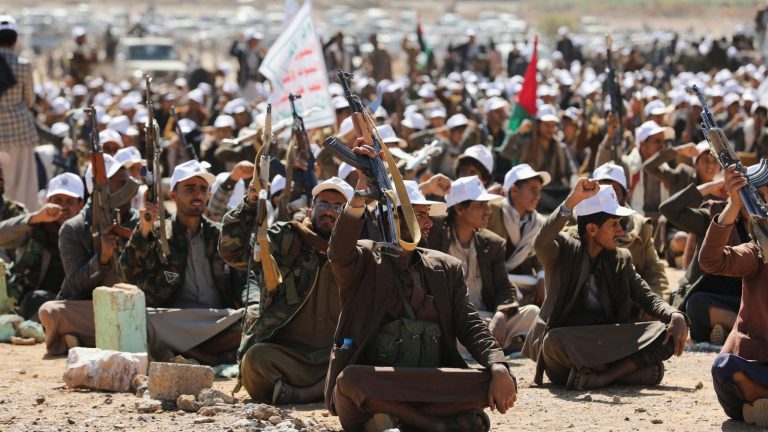Rishi Sunak said the UK “does not seek confrontation” with Houthi fighters in Yemen – but will strike again if their attacks in the Red Sea continue.
Royal Air Force aircraft participated in the second wave of joint operations between the United States and the United Kingdom against the group on Monday evening after continued attacks on the vital shipping lane.
Politics is live: Rishi Sunak says UK 'does not seek confrontation' with strikes on Houthis
The Prime Minister told MPs: “We do not seek confrontation. We urge the Houthis and those who enable them to stop these illegal and unacceptable attacks.”
“But if necessary, the UK will not hesitate to respond again in self-defence.
“We cannot stand idly by and allow these attacks to go unanswered. Inaction is also an option,” he added.
Sunak said new sanctions would be announced “in the coming days” in response to the Houthi attacks.
Outlining the UK's broader approach to the situation, he said the UK must “end the illegal flow of arms to the Houthi militia”, which is backed by Iran.
He added that this would include “working closely with our allies and partners to disrupt and deter weapons supplies and components.”
Mr Sunak added: “We will use the most effective means at our disposal to cut off the Houthis’ financial resources as they are being used to fund these attacks.
He added: “We are working closely with the United States on this matter and plan to announce new sanctions measures in the coming days.”
He said the UK would continue to help the Yemeni people “who have suffered greatly as a result of the civil war in the country.”
“We will continue to provide humanitarian assistance and support negotiated peace in this conflict.”
Four RAF Typhoon aircraft and a pair of Voyager tankers took part in the latest operation.
Several targets were hit in two military sites north of the Yemeni capital, Sanaa.
The Houthis target ships they claim are linked to Israel in the context of the conflict with Hamas.
But the UK and its allies warned that the attacks were indiscriminate and included targeting the Royal Navy and allied warships.
The Red Sea route to and from the Suez Canal is one of the world's most important shipping routes, and there are concerns that the cost of diverting ships away from it, around South Africa, will fuel inflation and harm the global economy.
Labor leader Sir Keir Starmer said he supported the measure, but wanted to see the government publish the legal advice it had received on the situation.
This results in criticism that… He was not informed of the operation ahead of time.
Sir Keir and Commons Speaker Sir Lindsay Hoyle were informed by Downing Street at the time of the strikes rather than before – as was the case in the latest round of proceedings.
MPs will have the opportunity to discuss the situation on Wednesday, but will not be allowed to vote on military action.
The Prime Minister's official spokesman said: “It is important that parliamentarians are able to have their say but we act in line with precedence.”
Many representatives want to vote, because they are concerned about the escalation of the conflict in the Middle East.
Labor MP España Begum said the strikes in Yemen were “escalating the risks” in the region, but the Prime Minister said it was wrong to “link” work in the Red Sea with the war in Gaza.


